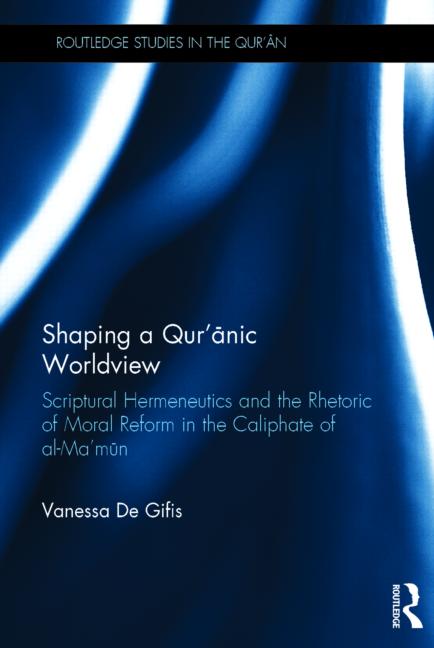New book: Shaping a Qur’anic Worldview
By Vanessa De Gifis*
It is commonplace in Islamic studies to acknowledge, in a general or clichéd way, that the Qur’an has an influence on Islamic thought and society. My new book, Shaping a Qurʾānic Worldview, was motivated by the desire to better understand the practical mechanisms by which Muslims bring the Qur’an to bear on real-world decision making. It is the first book to systematically examine references to the Qur’an in early medieval Islamic politics in light of classical Arabic-Islamic rhe torical and grammatical-semantic theories.
torical and grammatical-semantic theories.
Classical theoretical considerations of rhetorical circumstance, author-audience interlocution, and grammatical-semantic features inform my own approach to correlating the circumstances and techniques of Qur’anic referencing. I deploy the basic interrogatives─when, who, what, where, how, and why─that correspond to distinct yet interrelated areas of authorial deliberation manifested in political texts:
- When does Qur’anic referencing occur?
- Who are the interlocutors?
- What Qur’anic elements (verses, themes, literary forms) appear?
- Where along the rhetorical trajectory do Qur’anic elements appear?
- How are Qur’anic elements grammatically rendered and framed?
- Why are Qur’anic references logically or rhetorically persuasive?
To illustrate the critical connections between the formal techniques of Qur’anic referencing and the socio-historical circumstances of their execution, the book presents a case study of Arabic texts attributed to the ʿAbbāsid Caliph al-Maʾmūn (r. 813-833 C.E.), who is famous for entwining scriptural theology and political machination in his controversial “test” (mihna) to enforce the doctrine of the createdness of the Qur’an, and whose rule coincided with the maturation of classical Islamic political thought and literary culture. Rhetorical analysis reveals how Qur’anic referencing functions as analogical exegesis, whereby verses in the Qur’an are reinterpreted through the lens of subjective experience, and at the same time socio-historical experiences are understood in Qur’anic terms. Through strategic deployment of scriptural references within the logical scheme of rhetorical argument, the Caliph constructs moral analogies between paradigmatic characters in the Qur’an and people in his social milieu, and situates himself as a pivotal moral reformer and agent of divine command, in order to persuade his audiences of the necessity of the Caliphate and the religio-moral imperative of obedience to his authority.
The Maʾmūnid case study contains classical examples of ubiquitous themes and techniques of Qur’anic referencing, indicative of the nature and function of the phenomenon across historical periods. Exploring the use of the Qur’an in rhetorical argument is especially apt to discern inter-subjective, negotiated understandings of the Qur’an, in a mode of interpretation that is inherently and deliberately more dialogical than conventional exegetical literature. My aim with the book is to contribute to ongoing scholarly inquiries about the rhetorical features of the Qur’anic corpus and to stimulate broader conversations about the practical impact of the Qur’an on the articulation of distinctly Islamic moral values and historical vision.
*DeGifis is Assistant Professor of Islamic Studies and Graduate Advisor for Near Eastern Languages at Wayne State University in Detroit, Michigan. Her book, Shaping a Qurʾānic Worldview, will be available in e-book form on April 11, 2014. She welcomes correspondence at vdegifis@wayne.edu.
© International Qur’anic Studies Association, 2014. All rights reserved.
